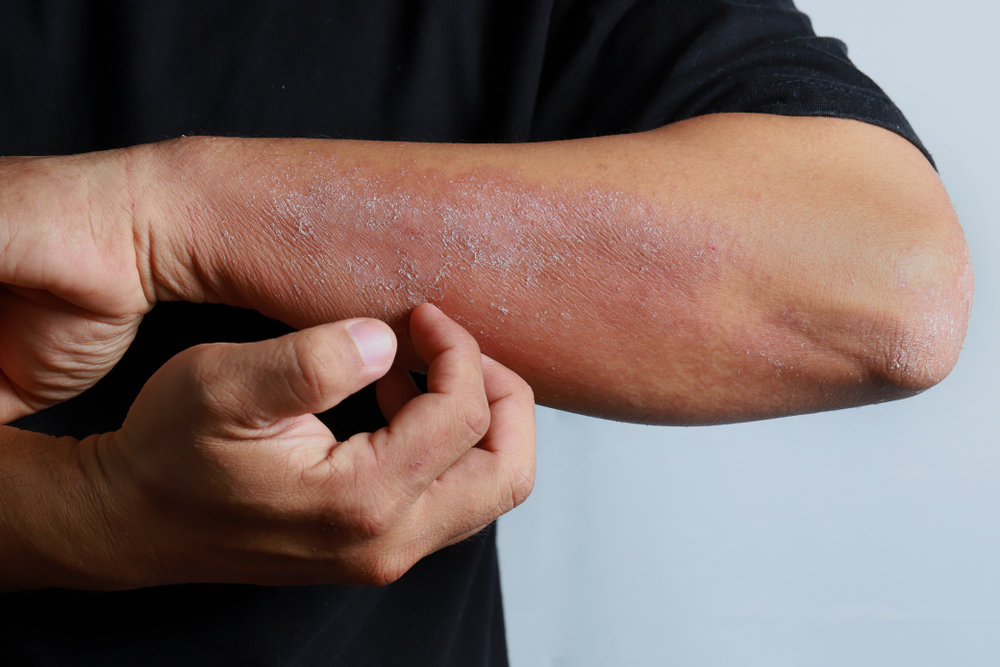People with severe eczema face a hidden cost of living crisis

New report from Sanofi shines a light on the hidden financial burden faced by sufferers of severe atopic eczema.
Nearly everybody has felt the pressures of the cost-of-living crisis. Prices rising, bills soaring, and having to do more with less. This is a real concern for so many, but it’s even worse for people living with uncontrolled atopic eczema, who have to contend with additional costs, both direct and indirect, which are causing a significant strain on both individuals and the healthcare system.
Atopic eczema – known medically as atopic dermatitis (AD) – is the most common form of eczema in the UK, affecting 5-10 per cent of all adults, and causing the skin to become itchy; during a flare-up it can become red, cracked and sore. From the financial costs of medications to an increased risk of developing depression, the costs of uncontrolled eczema to many people living with the condition are wide-ranging and detrimental to their quality of life, particularly for people from lower socioeconomic backgrounds.
Eczema can often be overlooked as a healthcare issue by the general public, and Sanofi recognises the significance of highlighting the genuine effects on the individual that it can cause. Sanofi’s aim is to increase awareness and shine a light on the true cost of the condition. So, we commissioned leading cross-party think tank Demos to produce a report which analyses the impact that uncontrolled atopic eczema has on patients, the NHS and wider society.
The Costs of Atopic Dermatitis report, published in April 2023, draws on an evidence review of UK and international literature, interviews with clinicians in England and the experiences of people living with eczema to examine the costs, the current state of patient care and how patient care can be improved.
The financial burden of eczema
The report provides insights into the costs borne by people living with uncontrolled eczema. This financial burden is far more significant than many might expect. One clinician Demos interviewed said that sometimes patients with lower socioeconomic status have to make a choice between paying for medication or buying food. This cost to society goes beyond just the healthcare system, hitting the economy as a whole. In the UK, the indirect costs of work impairment to the economy for adult patients with moderate-to-severe atopic eczema is estimated to be between £6,741-£14,166 per patient, per year.
But why does it cost so much? Firstly, people living with severe eczema have to spend money on both medical and non-medical items such as medicines, emollients and moisturizers. The impact the condition has on their ability to work also adds to the personal financial cost. Patients with severe, uncontrolled atopic eczema often need to take additional sick days and they may even lose work because of their condition. Then there are the intangible costs: people living with eczema may have to deal with sleep impairment and other mental health issues exacerbated by the irritation and appearance of their skin.
There is an impact on the NHS too. The direct cost of mild-to-moderate eczema to the health service was estimated as being at least £257m in 2020, though there have been no comprehensive studies encompassing the costs of severe atopic eczema. It is estimated that around 15-20 per cent of GPs’ workload is dermatology, with a large quantity of that work being eczema.
Reforming dermatology pathways
The Costs of Atopic Dermatitis report has shone a light on the problem. We now need to focus on how we can alleviate this financial burden. That means investment in improvements to the standard of care for people living with atopic eczema, to drive positive outcomes for patients and reduce long-term costs to the health service and the economy.
If integrated care systems develop dermatology strategies and ensure that psychological support is commissioned as part of the dermatology pathway, these costs can be significantly reduced, by lessening the mental burden of eczema. We as a country need to do more to ensure that healthcare professionals know about the full range of support available to patients. It is vital that patients feel supported by their doctors to access mental health care where appropriate, and that GPs have the training and resources needed to provide the best care possible to their patients with eczema.
Through commissioning this report, Sanofi hopes it has played some small part in bringing the issue of atopic eczema and its cost to us all into relief. The next steps, however, need to be taken by decision makers as they decide whether they want to act to rescue the costs of eczema to patients and our healthcare system.
This article was written by Sanofi.
Job bag code: MAT-XU-2304180 (V1.0)
Date of prep: Sept 2023